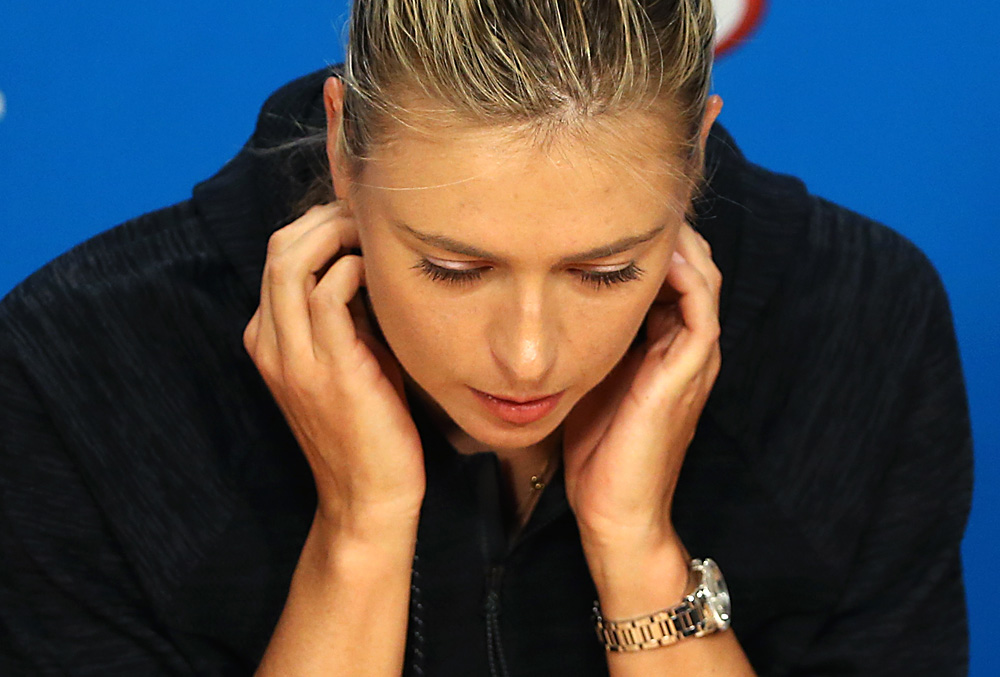
In a statement admitting a positive test for doping during the Australian Open, Maria Sharapova mentioned the drug mildronate, the main active substance in meldonium.
APThe doping sensation that has surrounded Russian tennis star Maria Sharapova over her use of the recently banned substance meldonium could result in further unwanted repercussions for Russian sports, with a number of top athletes at risk of being disqualified for a period of four months to four years.
Meldonium, the primary element of the mildronate drug that was developed in 1975 by Latvian professor Ivan Kalvinshem, was included in the World Anti-Doping Agency (WADA) blacklist on Jan. 1, 2016. However, many leading Russian athletes ignored the ban.
Olympic champions Ekaterina Bobrova (figure skater), Semion Elistratov (short-track speed skater), world champion Pavel Kulizhnikov (speed skater), European champion Ekaterina Konstantinova (short-track) and two-time Universiade winner Alexander Markin (volleyball) have also tested positive for meldonium.
Russian Sports Minister Vitaly Mutko has blamed the current doping scandal on doctors and coaches.
"We explained everything to everyone half a year ago. The federations, the coaches and the doctors must be more responsible," said the minister in an interview with R-Sport.
Mutko also admitted that the national team doctors might have not read the updated list of banned drugs. The sports minister claimed that medical staff do not have time to follow WADA's updates due to the "enormous amount of work" with the athletes.
Professor Andrei Smolensky, director of the National Research Institute of Athletic Medicine at the Russian State University of Physical Education, Sport, Youth and Tourism (SCOLIPE), which has prepared numerous Soviet and Russian Olympic champions, agrees with Mutko.
"The doctors of the athletics federations are to blame for the story with meldonium,” he said. “They are not always careful in their responsibilities. WADA has severe rules that must unquestionably be followed.”
According to Smolensky, meldonium remains in the blood for “up to three months,” which is why the athletes had to stop taking the drug in October.
“Our doctors did not have the situation under control," he said.
However, athletics officials may also have to pay for the doping scandal. This is what Dmitri Nossov, a State Duma deputy and judo bronze medalist at the 2004 Olympics is insisting on.
"Not one professional athlete will start taking something without his or her doctor and it is the federation directors that must control the doctors' activities," said Nossov.
In his view, only the dismissal of the directors of the federations affected by the scandal will force everyone to think about the doping issue.
However, Alisher Aminov, vice president of the International Foundation of Support for Legal Initiatives, believes that Russian Sports Minister Vitaly Mutko should be the one to resign.
"The athletes were given banned drugs recommended by one center that was employing doctors and receiving instructions from Minister Mutko, the individual who more than anyone is interested in medals and victories,” said Aminov.
“The most effective way to overcome this dishonesty in Russian sport is to launch an independent public inquiry with the involvement of international organizations. Mutko must temporarily be removed from office until the end of the inquiry," he said.
At the same time, discussions are still raging in Russia about whether or not WADA's decision to ban meldonium is justified. Former Russian Olympic team doctor Zurab Ordzhonikidze thinks that the use of meldonium cannot be considered doping.
"It does not have a stimulating effect. It is a normal cardio-protector. If WADA places mildronate on its blacklist, then according to this logic, even drinking water can be considered illegal. Water is also, in a sense, a cardio-protector," said Ordzhonikidze.
But athletics doctor Alexander Yardoshvili, who in the past collaborated with the Russian national soccer team, as well as the CSKA and Lokomotiv Moscow clubs, does not agree with Ordzhonikidze.
"Mildronate reduces the amount of creatine and synthesizes fatty acids. As a result, oxygen is freed that begins to actively nourish the zones that need it,” said Yardoshvili in an interview with the Gazeta.ru publication.
“Also, the drug produces magnesium in the organism and this element improves the activity of bones, ligaments, tendons and muscles, the whole musculoskeletal system," he said.
All rights reserved by Rossiyskaya Gazeta.
Subscribe
to our newsletter!
Get the week's best stories straight to your inbox